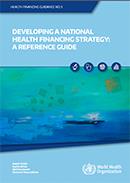Addressing the political economy of health financing reform
Incorporating political economy analysis into health financing reform processes can help policy makers develop more effective approaches to navigate political challenges that arise when introducing policy change. WHO has developed an approach to analyze the political economy of health financing reform to support strategies that supports progress towards UHC. This approach shows how integrating the analysis of relevant stakeholders, their respective position and power relative to a reform objective, and the political economy context within which they operate helps to identify challenges and opportunities associated with health financing reform.
WHO’s analysis of the political economy of health financing reform shows that while each country context differs, there are some key strategies that can be used to strategically manage reform processes:
- Technical work matters: It is essential to be technically ready political windows of opportunity open.
- Think strategically about implementation sequencing: Resistance from key stakeholders can be reduced through strategic sequencing of reform elements.
- Compromise is almost always needed: Strategic compromises are often needed to advance reform but not in a way that undermines their core objectives.




